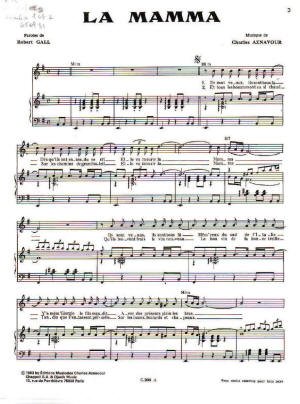Aznavour, Charles - La Mamma
 for {voicing} and {Instrumentation}
for {voicing} and {Instrumentation}
 |
Composer: Charles Aznavour (*1924) aliases, aka: b. Shahnour Vaghenag Aznavourian Country of origin / activity: France / Armenia |
|
| Text author: R. Gall (s.a.) | ||
| Arranger / Editor: N/A |
Available documentation:
Score:  |
| My thanks and appreciation to Cyrille Jennequin for sending me this score. |
Lyrics:
The Mama / the gipsy queen.
This story tells about the oncoming death of a old gipsy queen. Her family has come from far and wide. While they wait with her, they sing the Ave Maria.
| Original French version (source) | |
|
Ils sont venus, ils sont tous là |
Et tous les hommes ont eu si chaud, |
| Dutch version (source) | |
|
LA MAMMA (ZIGEUNER KONINGIN) |
Ze zijn op tijd, staan om haar heen |
| MIDI: not available | MP3: not available |
Recording:
| not available |
Video - posted on YouTube:
| Playback restricted Watch on YouTube. |
Internet references, biography information:
| http://en.wikipedia.org/wiki/Charles_Aznavour |
|
From Wikipedia, the free encyclopedia Aznavour leads here. For other uses of Aznavour, see Aznavour (disambiguation) In 1998, Aznavour was named Entertainer of the Century by CNN and users of Time Online from around the globe. He was recognized as the century's outstanding performer, with nearly 18% of the total vote, edging out Elvis Presley and Bob Dylan.[7] He has sung for presidents, popes and royalty, as well as at humanitarian events, and is the founder of the charitable organization Aznavour for Armenia along with his long-time friend impresario Levon Sayan. In 2009, he was appointed ambassador of Armenia to Switzerland, as well as Armenia's permanent delegate to the United Nations at Geneva.[8] He started his new Aznavour en Toute Intimité tour in 2011. Contents [hide] Music[edit]Sometimes described as "France's Frank Sinatra",[15] Aznavour sings frequently about love. He has written musicals and about a thousand songs, and made more than one hundred records. Aznavour's voice is shaded towards the tenor range, but possesses the low range and coloration more typical of a baritone, contributing to his unique sound. Aznavour speaks and sings in many languages (French, English, Italian, Spanish, German, Russian, Armenian, Portuguese, Neapolitan), which has helped him perform at Carnegie Hall, in the USA, and other major venues around the world. He also recorded at least one song from the 18th century Armenian poet Sayat Nova, and a popular song, Im Yare[16] in Armenian. Que C'est Triste Venise, sung in French, Italian (Com'è Triste Venezia), Spanish (Venecia Sin Ti), English (How Sad Venice Can Be), and German (Venedig in Grau), is one of Aznavour's most famous multilingual songs. In 1974, Aznavour became a major success in the United Kingdom where his song "She" went to Number One in the charts. His other well-known song in the UK was "Dance in the Old Fashioned Way".
At the start of autumn in 2006, Aznavour initiated his farewell tour, performing in the US and Canada, and earning very positive reviews. Aznavour started 2007 with concerts all over Japan and Asia. The second half of 2007 saw Aznavour return to Paris for over 20 shows at the Palais des Congrès in Paris, followed by more touring in Belgium, the Netherlands, and the rest of France. He has repeatedly stated that this farewell tour, health permitting, will likely last beyond 2010. At 89, Aznavour is in excellent health, although admittedly 60 years on stage have made him "a little hard of hearing".[22] He still sings in multiple languages and without persistent use of teleprompters, but typically sticks to just two or three (French and English being the primary two, with Spanish or Italian being the third) during most concerts.[23] On 30 September 2006, Aznavour performed a major concert in Yerevan, the capital of Armenia to start off the cultural season "Arménie mon amie" in France. Armenian president Robert Kocharyan and French president Jacques Chirac, at the time on an official visit to Armenia, were in front-row attendance.[24]
"Forever Cool" (2007), an album from Capitol/EMI, features Aznavour singing a new duet of "Everybody Loves Somebody Sometime" with the voice of the late Dean Martin. Aznavour finished a tour of Portugal in February 2008. On 18 January 2008, he participated as guest vocalist with the contestants of the French reality show Star Academy and sang his famous Emmenez-Moi with contestant Jérémy Chapron. Throughout the spring of 2008, Aznavour toured South America, holding a multitude of concerts in Argentina, Brazil, Chile and Uruguay. Summer saw him in Quebec, and a return to Latin America followed in autumn. An admirer of Quebec, where he played in Montreal cabarets before becoming famous, he has helped the career of Québécoise singer-songwriter Lynda Lemay in France, and has a house in Montreal. On 5 July 2008, he was invested as an honorary officer of the Order of Canada and performed the following day on the Plains of Abraham as a feature of the celebration of the 400th anniversary of the founding of Quebec City.[25] In 2008, an album of duets, Duos, was released. It is a collaborative effort featuring Aznavour and his greatest friends and partners from his long career in the music industry, including Céline Dion, Sting, Laura Pausini, Josh Groban, Paul Anka, Plácido Domingo, and many others.[26] It was released on various dates in December 2008 across the world.[27] His next album, Charles Aznavour and The Clayton Hamilton Jazz Orchestra (previously known as Jazznavour 2), is a continuation in the same vein as his hit album Jazznavour released in 1998, involving new arrangements on his classic songs with a jazz orchestra and other guest jazz artists. It was released on 30 November 2009.[28] Aznavour and famed Senegalese singer Youssou N'Dour, with the collaboration of over 40 of France's most celebrated singers and musicians, recorded a music video band aid (clip) in the aftermath of the catastrophic 2010 Haiti earthquake, titled "1 geste pour Haïti chérie".[29] In 2009, Aznavour also toured across America. The tour, named Aznavour en liberté,[30] started in late April 2009 with a wave of concerts across the United States and Canada, took him across Latin America in the autumn, as well as the USA once again. In August 2011 Aznavour released a new album, Aznavour Toujours, featuring 11 new songs, and Elle, a French re-working of his greatest international hit, She. Following the release of Aznavour Toujours, 87-years old Aznavour began a tour across France and Europe, named Charles Aznavour en Toute Intimité, which started with 21 concerts in the "Olympia" theatre in Paris.[31] On 12 December 2011 he gave a concert in Moscow State Kremlin Palace that attracted a capacity crowd.[32] The concert was followed by standing ovation which continued for about 15 minutes.[33] In 2012, Aznavour embarked on a new North American leg of his "En toute intimité" tour, visiting Québec, New York and the Gibson Amphitheatre, the third-largest such venue in California, for multiple shows.
Aznavour has had a long and varied parallel career as an actor, appearing in over 60 films. In 1960 Aznavour starred in François Truffaut's Tirez sur le pianiste, playing a character called Édouard Saroyan. He also put in a critically acclaimed performance in the 1974 movie And Then There Were None. Aznavour had an important supporting role in 1979's The Tin Drum, winner of the Academy Award for Best Foreign Language Film in 1980. Aznavour starred in the 2002 movie Ararat playing Edward Saroyan, a movie director. Armenia and abroad[edit]Since the 1988 earthquake in Armenia, Aznavour has been helping the country through his charity, Aznavour for Armenia. Together with his brother in-law and co-author Georges Garvarentz he wrote the song "Pour toi Arménie", which was performed by a group of famous French artists and topped the charts for 18 weeks. There is a square named after him in central Yerevan on Abovian Street, and a statue erected in Gyumri, which saw the most lives lost in the earthquake. In 1995 Aznavour was appointed an Ambassador and Permanent Delegate of Armenia to UNESCO. Aznavour is a member of the Armenia Fund International Board of Trustees. The organization has rendered more than $150 million in humanitarian aid and infrastructure development assistance to Armenia since 1992. He was appointed as "Officier" (Officer) of the Légion d'honneur in 1997. In the 1984 version of Die Fliedermaus, he appears and performs as one of Prince Orlovsky's guests. This version stars Kiri Te Kanawa and was directed by Plácido Domingo in the Royal Opera House at Covent Garden.[34] In 2004 Aznavour received the title of "National Hero of Armenia" for his humanitarian work, Armenia's highest award. On 26 December 2008, President of Armenia Serzh Sargsyan signed a presidential decree for granting citizenship for the Republic of Armenia to Aznavour whom he called a "prominent singer and public figure" and "a hero of the Armenian people".[35][36][37][38] Personal life and cultural impact[edit] His musicality and fame abroad is present in many other areas of pop culture. Aznavour's name was used as the basis for the name of the character Char Aznable by Yoshiyuki Tomino in his 1979 mecha anime series, Mobile Suit Gundam. His song "Parce Que Tu Crois" was sampled by Hip Hop producer Dr. Dre for the song "What's the Difference" (feat. Eminem & Xzibit), from his album 2001.[42] He is mentioned in The Psychedelic Furs song "Sister Europe" ("The radio upon the floor/ is stupid, it plays Aznavour"). He has often joked about his physicality, the most infamous feature of which is his limited height; he stands only 160 cm (5 ft 3 in) tall, and Aznavour has made this a source of self-deprecating humour over the years. Politics[edit]Aznavour has been increasingly involved in French, Armenian and international politics as his career has progressed. During the 2002 French presidential elections, when radical right-wing nationalist Jean-Marie Le Pen of the National Front made it into the runoff election, facing incumbent Jacques Chirac, Aznavour signed the "Vive la France" petition, and called on all French to "sing the Marseillaise" in protest.[43] Chirac, a personal friend of Aznavour's, ended up winning in a landslide, carrying over 82% of the vote. He has written a song about the Armenian Genocide, titled "Ils sont tombés" (known in English as "They fell"). He has also campaigned fervently for international copyright law reform. In November 2005 he met with President of the European Commission José Manuel Barroso[44] on the issue of the review of term of protection for performers and producers in the EU, advocating an extension of the EU's term of protection from the current 50 years to the United States' law allowing 95 years, saying "[o]n term of protection, artists and record companies are of the same mind. Extension of term of protection would be good for European culture, positive for the European economy and would put an end the current discrimination with the U.S." He has also notably butted heads with French politician Christine Boutin over her defense of a "global license" flat-fee authorization for sharing of copyrighted files over the Internet, claiming that the license would eliminate creativity. In May 2009 the French Senate approved one of the strictest internet anti-piracy bills ever with a landslide 189-14 vote. Aznavour was a vocal proponent of the measure and considered it a rousing victory: "If the youth can't make a living through creative work, they will do something else and the artistic world will be dealt a blow... There will be no more songs, no more books, nothing at all. So we had to fight..."[45] Along with holding the mostly ceremonial title of French ambassador-at-large to Armenia, Aznavour agreed to hold the position of Ambassador of Armenia to Switzerland on 12 February 2009: "First I hesitated, as it is not an easy task. Then I thought that what is important for Armenia is important for us. I have accepted the proposal with love, happiness and feeling of deep dignity"[46] |
 avemariasongs
avemariasongs org
org